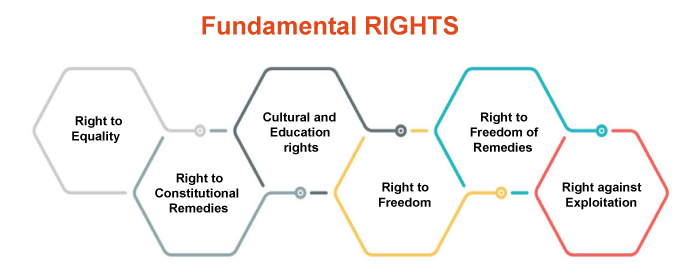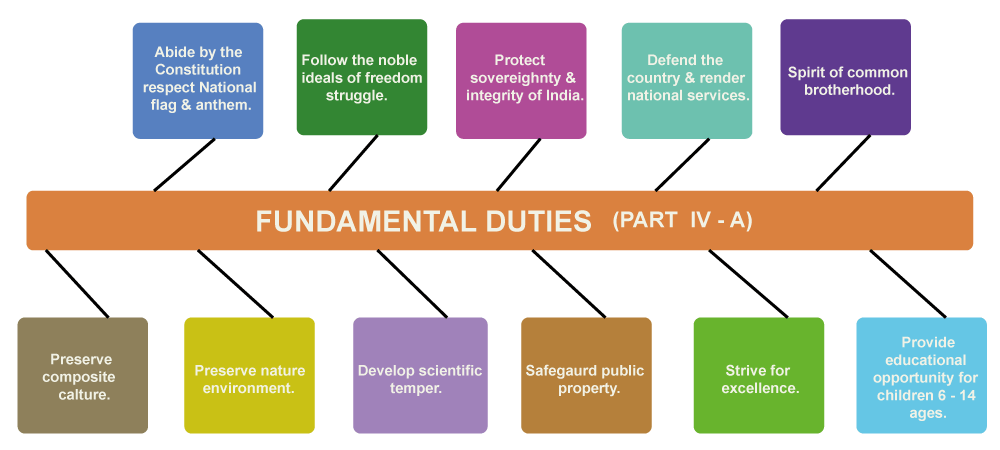Difference Between Fundamental Rights and Fundamental DutiesIntroductionEvery Indian citizen has access to fundamental rights, which are fundamental human rights, and the Constitution's Third Amendment protects them. These include rights to equality, freedom, protection against exploitation, and religious liberty, as well as rights to culture, education, and constitutional remedies. On the other hand, Fundamental Duties are moral obligations of citizens towards their country and society. They were added to the Constitution upon the recommendations of the Swaran Singh Committee and are present in Part IV A. These duties include respecting the Constitution and national flag, cherishing noble ideals of freedom struggle, and protecting India's sovereignty and integrity, among others. What are fundamental rights?The Magna Carta was a legal document signed in England in 1215 and is where the idea of fundamental rights originates. This Constitution stated that everyone was legally accountable to the law, including the monarch, and everyone had some fundamental rights that the State was not allowed to infringe upon. The Indian Constitution, adopted on November 26, 1949, is where the concept of fundamental rights was first introduced in the Indian context, and it started working on January 26, 1950. The Indian Constitution laid the breaking stone work for the biggest democracy on the planet. 
The Part III of the Indian Constitution contains fundamental rights, and the Universal Declaration of Human Rights, which the UN ratified in 1948, inspired them. The Indian Constitution guarantees all Indian citizens six fundamental rights: the rights to equality, freedom, right against exploitation (protection from exploitation), freedom of religion, rights to culture and education, and the right to constitutional remedies. Fundamental rights have been essential in safeguarding the rights of the public and have made a vital contribution to the evolution of Indian democracy over time. To protect these rights, the Indian court system has taken several initiatives. The status of fundamental rights in India has improved due to some significant judgments it established. Every person has a set of fundamental rights to which they are entitled by being a member of the human race. Six fundamental rights are guaranteed to all inhabitants of India by the Constitution. These rights include equality, freedom, protection against exploitation, religious liberty, access to culture and education, and constitutional remedies 1. The right to equality ensures that everyone is treated equally before the law and prohibits discrimination based on religion, race, caste, sex, or place of birth. The right to freedom guarantees freedom of speech, expression, assembly, and movement. The right against exploitation prohibits human trafficking, forced labor, and child labor. 2. The right to freedom of religion guarantees that everyone can practice, profess, and propagate any religion they choose. Cultural and educational rights ensure everyone can conserve their culture, language, and script and receive an education. The right to constitutional remedies allows citizens to approach the courts for the enforcement of their fundamental rights The right to freedom is a fundamental right recognized by the Constitution of India. In the Indian context, this right includes several freedoms essential for developing a democratic society. The following are the critical components of the right to freedom in India:
These freedoms are subject to certain reasonable restrictions, such as in the interests of national security, public order, and morality. Additionally, the right to freedom is not absolute and must be balanced against other fundamental rights, such as the right to life and privacy. Overall, the right to freedom is a critical component of Indian democracy. It ensures that citizens can express their views, participate in civic life, and pursue their goals without interference. 3. The Right Against Exploitation protects individuals from being taken advantage of or used unfairly and in harmful ways. This includes things like trafficking, forced labor, and child labor.
The Right Against Exploitation is meant to protect people from these abuses. It ensures that no one can be forced to work against their will and that children can attend school and enjoy their childhoods. 4. Cultural and Educational Rights are a crucial part of the Indian Constitution that aims to preserve and promote the diverse cultural heritage of India while ensuring that education is accessible to all. Article 29 protects the right of any section of Indian citizens to have a distinct language, script, or culture to conserve it. People from different cultural groups have the right to preserve their unique customs, language, and traditions. For example, if someone from Tamil Nadu wants to conserve their Tamil language and culture, Article 29 ensures they can do so without discrimination or interference. Article 30, on the other hand, protects the right of religious and linguistic minorities to establish and administer educational institutions of their choice. This means that minority groups such as Muslims, Christians, and Sikhs have the right to establish their schools and colleges to promote their language, culture, and religion. This is important because it ensures these groups access education tailored to their needs and beliefs, promoting diversity and inclusivity in the Indian education system. Cultural and Educational Rights ensure that every Indian citizen has the right to preserve their cultural identity while accessing education tailored to their unique needs and beliefs. These rights are crucial for promoting diversity and inclusivity in India, and they help to ensure that every citizen has an equal opportunity to succeed and thrive. 5. The Right to Constitutional Remedies is one of the most potent fundamental rights guaranteed to every citizen of India by the Constitution. It is enshrined in Article 32, also known as the "heart and soul" of the Constitution. So, what is this right all about? Imagine a situation where the government or any authority is violating your fundamental rights. For example, let us say your freedom of speech and expression is curtailed, or you are detained without any valid reason. The Right to Constitutional Remedies comes to your rescue in such a scenario. This right empowers you to move to the Supreme Court to enforce your fundamental rights. In other words, if you feel that your fundamental rights are being violated, you can directly approach the Supreme Court, the highest court in India, and seek a remedy. Now, you may wonder, how is this different from other legal remedies? Well, the beauty of this right is that it allows you to approach the Supreme Court directly without going through any lower court. This means you can seek justice swiftly and efficiently without unnecessary delays. Moreover, the Supreme Court has the power to issue writs, orders issued by the court to any authority, including the government, to perform its duty. These writs include habeas corpus, mandamus, prohibition, certiorari, and quo warranto. Each of these writs has its specific purpose and can be used to address different kinds of grievances. The Right to Constitutional Remedies is a powerful tool that empowers citizens to seek justice and enforce their fundamental rights. It is a testament to the commitment of the Indian Constitution to protecting the rights of its citizens and ensuring a just and equitable society. 6. The Right to Equality is a fundamental right guaranteed to all citizens of India under Articles 14-18 of the Indian Constitution. This right is essential for an individual's development and progress and for preserving a democratic society. In simpler terms, the Right to Equality means that all individuals are equal before the law and are entitled to equal protection of the law. This means that no one can be discriminated against based on religion, race, caste, sex, or place of birth. For example, let us say there are two people - one from a wealthy family and the other from a low-income family. If both commit the same crime, they should be punished equally under the law, regardless of their socio-economic status. Similarly, suppose two people apply for the same job. In that case, they should be given equal consideration based on their qualifications and experience, regardless of gender or caste. The Right to Equality also includes the right to equal opportunity in matters of employment, education, and public service. This means everyone should have an equal chance to get a job or education, regardless of their background or social status. However, the Right to Equality does not mean everyone should be treated equally. It recognizes that certain groups may need special protection and affirmative action to ensure that they are not discriminated against. For example, women and members of lower castes may need extra support and opportunities to overcome historical disadvantages. Fundamental DutiesFundamental duties are a set of moral obligations that are enshrined in the Indian Constitution. They were added to the Constitution in 1976 to promote patriotism, national unity, and respect for the country's rich cultural heritage. There are 11 fundamental duties in total, which are listed in Article 51A of the Indian Constitution. These duties include respecting the national flag and the Constitution, promoting harmony between different communities, and protecting the environment. 
One of the essential fundamental duties is to uphold and protect India's sovereignty, unity, and integrity. This means that, as Indian citizens, we must put our country's interests above ours. We must promote national integration and unity and prevent forces seeking to divide or harm our nation. Another fundamental duty is to promote harmony and brotherhood between all people in India. This means we must respect and appreciate the diverse cultural, religious, and linguistic traditions that make our country unique. We should also work to bridge gaps or differences between different groups and promote mutual understanding and respect. Protecting the environment is another essential fundamental duty. As citizens, we are responsible for conserving our natural resources and preventing activities that might harm the environment. This includes reducing our carbon footprint, conserving water, and protecting wildlife and natural habitats. As fundamental duties are crucial to being a responsible and engaged citizen in India. By upholding these duties, we can create a more harmonious society and build a stronger and more prosperous India for future generations. The fundamental duties are a set of moral obligations that are enshrined in Article 51A of the Indian Constitution. They were added to the Constitution in 1976 to promote patriotism, national unity, and respect for the country's rich cultural heritage. There are a total of eleven fundamental duties that are listed below:
These fundamental duties are a set of moral obligations that Indian citizens are expected to uphold to promote patriotism, national unity, and respect for the country's rich cultural heritage, as well as to work towards the progress and development of the nation. Difference Table
Next TopicDifference between
|
 For Videos Join Our Youtube Channel: Join Now
For Videos Join Our Youtube Channel: Join Now
Feedback
- Send your Feedback to [email protected]
Help Others, Please Share










